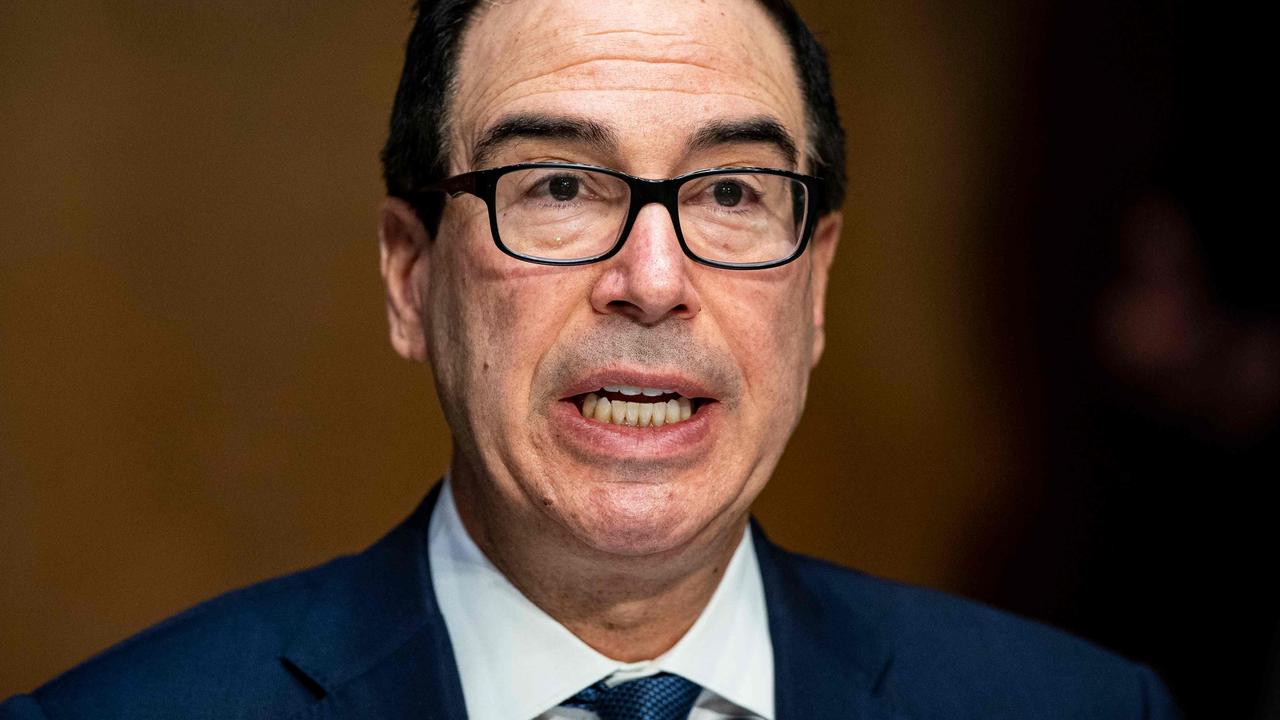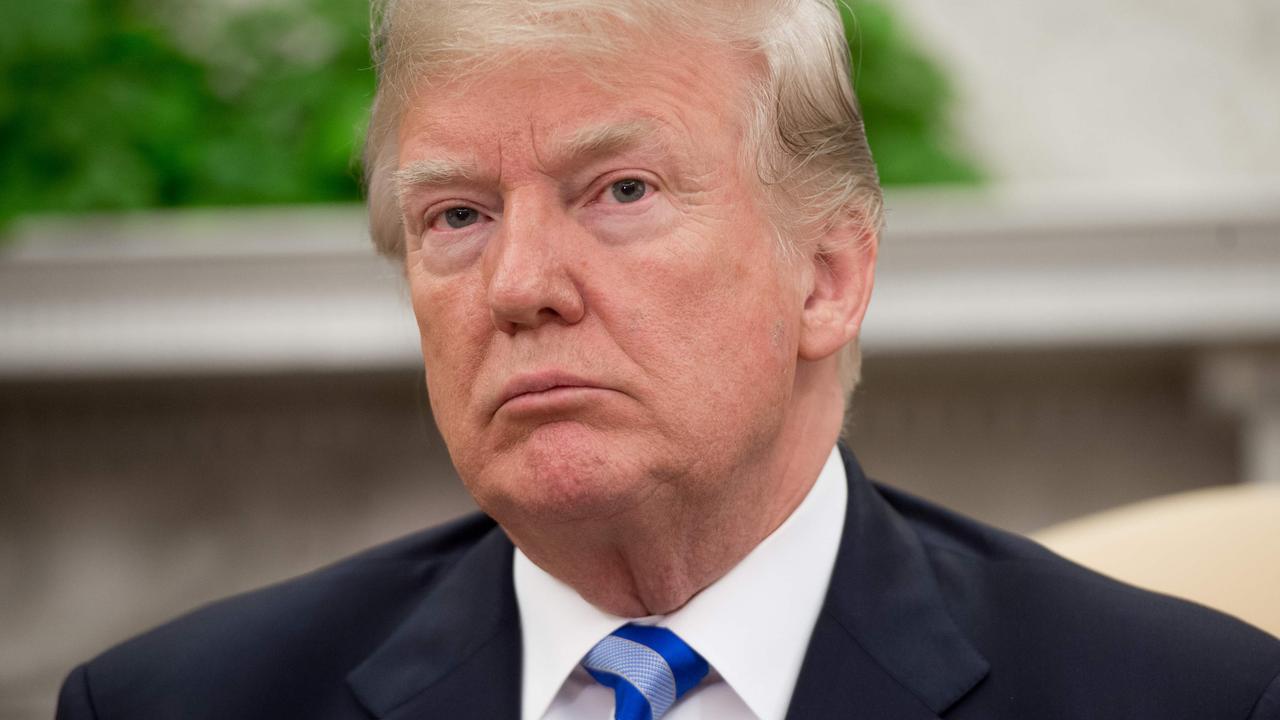US faces potential government shutdown as President Trump unloads on COVID relief bill
A government shutdown is looming in the US after President Donald Trump stunned his own party with a last-minute decision.
A government shutdown may be looming in the United States, with President Donald Trump expressing last-minute opposition to a coronavirus relief package passed by Congress.
The $US900 billion package is part of a broader, $2.3 trillion spending deal which passed with bipartisan backing late on Monday night. It was supported by 92 of the 100 US senators, and now requires the President’s signature.
The legislation includes funding for federal agencies which will otherwise run out of money next week, sparking a shutdown. It also stops millions of Americans from losing their unemployment benefits the day after Christmas.
The coronavirus relief package would send most Americans a direct payment of $600, among other measures such as continued tax relief for businesses.
The legislation’s passage through Congress came after months of failed negotiations between Democrats and Republicans, who struggled to reach an agreement on its scope and contents.
In the end, the massive 5600-page bill was passed in a rush, before most senators even had a chance to read it in any detail.
That didn’t seem to bother Mr Trump’s Treasury Secretary Steven Mnuchin, who represented the White House in the negotiations, and hailed the deal as “fabulous” on Monday.
“We’ve been working for months on additional money for these parts of the economy and we couldn’t be more pleased that we got this done in time for the end of the year,” Mr Mnuchin told CNBC.
“The good news is this is a very, very fast way of getting money into the economy. Let me emphasise, people are going to see this money at the beginning of next week. It’s money that gets recirculated in the economy, and that helps small business, and that helps get more people back to work.
“Getting a deal over the finish line, there is a lot of compromise that is needed, so you know – this overall bill, I think, is fabulous.
“This is a large bill and has a little bit of everything in it for everybody.”
RELATED: Donald Trump fumes over ‘ultimate betrayal’

Mr Trump disagrees.
The President had no significant involvement in the negotiations, preferring to leave them to Mr Mnuchin and congressional Republicans. In recent weeks, he has remained focused on his attempts to overturn the result of the presidential election.
Yesterday, after the legislation had already passed, Mr Trump surprised his own party by labelling it a “disgrace” and suggesting he would veto it.
“Throughout the summer, Democrats cruelly blocked COVID relief legislation in an effort to advance their extreme left-wing agenda and influence the election,” Mr Trump said in a video posted on social media.
“Then, a few months ago, Congress started negotiations on a new package to get urgently needed help to the American people. It’s taken forever.
“However, the bill they are now planning to send back to my desk is much different than anticipated. It really is a disgrace.”
RELATED: Confusion over US election map
Statement by Donald J. Trump, The President of the United States
— Donald J. Trump (@realDonaldTrump) December 23, 2020
Full Video: https://t.co/avKfYctPAD pic.twitter.com/i8IMLhH53Q
He has a few complaints about the legislation, foremost among them that the $600 payments are too small.
“This $900 billion package provides hardworking taxpayers with only $600 each in relief payments, and not enough money is given to small businesses, in particular restaurants, whose owners have suffered so grievously,” Mr Trump said.
“Congress found plenty of money for foreign countries, lobbyists and special interests while sending the bare minimum to the American people who need it.
“I am asking Congress to amend this bill and increase the ridiculously low $600 to $2000, or $4000 for a couple.
“I’m also asking Congress to immediately get rid of the wasteful and unnecessary items from this legislation and to send me a suitable bill, or else the next administration will have to deliver a package, and maybe that administration will be me, and we will get it done.”
The next administration will not, in fact, be run by Mr Trump. The electoral college has already confirmed Joe Biden’s victory, and the Trump campaign’s efforts to overturn the outcome in court have yielded no results.
Yes, I am as sick of writing that sentence as you are of reading it.
More importantly, the next administration will not be in place until January 20 – weeks into any potential government shutdown, and almost a month after the unemployment benefits expire.
It is unclear why Mr Trump waited until after the deal had been passed to express his concerns, instead of instructing Mr Mnuchin to seek the changes he wanted during the negotiations.

The Democrats, for their part, are keen to oblige the President’s request for larger stimulus cheques, though they have a very different process in mind.
House Speaker Nancy Pelosi has asked Mr Trump to sign the existing bill, then push congressional Republicans to agree to a subsequent measure for $2000 payments.
“Mr President, sign the bill to keep the government open!” she said today.
“Urge (Senate Leader) McConnell and (House Minority Leader) McCarthy to agree with the Democratic unanimous consent request for $2000 direct payments! This can be done by noon on Christmas Eve!”
Her proposed solution conspicuously ignores the rest of Mr Trump’s complaints about the legislation, which centre around specific spending items he views as wasteful. He mentioned some of them during that video yesterday.
“This bill contains $85.5 million for assistance to Cambodia, $134 million to Burma, $1.3 billion for Egypt and the Egyptian military – which will go out and buy almost exclusively Russian military equipment,” said the President.
“(It has) $25 million for democracy and gender programs in Pakistan, $505 million to Belize, Costa Rica, El Salvador, Guatemala, Honduras, Nicaragua and Panama.
“Forty million for the Kennedy Centre in Washington D.C., which is not even open for business. A billion for the Smithsonian, and an additional $154 million for the National Gallery of Art.
“Seven million for reef fish management, $25 billion to combat Asian carp, $2.5 million to count the number of amberjack fish in the Gulf of Mexico. A provision to promote the breeding of fish in federal hatcheries.
“The bill also allows stimulus cheques for the family members of illegal aliens, allowing them to get up to $1800 each. This is far more than the Americans are given.”
Confusingly, most of the spending measures Mr Trump singled out were nearly identical to ones he himself requested in his own budget proposal for FY2021 earlier this year.
To run through a few examples, Mr Trump’s proposal asked for: $82.5 million in aid for Cambodia; $131.4 million for Burma; $1.3 billion for Egypt and it’s military; $25 million for democracy and gender programs in Pakistan; $520 million for Belize, Costa Rica, El Salvador, Guatemala, Honduras, Nicaragua and Panama; $1.1 billion for the Smithsonian; $40.4 million for the Kennedy Centre; and $162 million for the National Gallery.
Pres. Trump can pardon my cynicism (pun intended), but he’s been proposing budgets and signing bills for four years with provisions identical or nearly identical to the ones he’s complaining about. The entire legislative process needs to be overhauled to restore accountability. https://t.co/alZycxpLvK
— Justin Amash (@justinamash) December 23, 2020
President Trump last night criticized foreign aid in the Omnibus spending bill approved by Congress, specifically citing $1.3 billion in US aid for Egypt's military.
— Jamie Dupree (@jamiedupree) December 23, 2020
$1.3 billion for Egypt is exactly how much the Trump Administration asked Congress for in the 2021 budget. pic.twitter.com/E8o5w4s8E5
The funding figures Trump complained about for the Kennedy Center, National Gallery and Smithsonian are actually lower than what he requested in his budget in February pic.twitter.com/54r3uMZxSF
— Kevin Liptak (@Kevinliptakcnn) December 23, 2020
So what happens next?
Due to procedure, the bill is not expected to actually arrive on Mr Trump’s desk until tomorrow, or maybe even Friday US time. He can then choose to veto it.
Should that happen, Congress can then attempt to override the President’s veto, which requires a two-thirds supermajority in both chambers.
The numbers appear to be there. The bill passed 359-53 in the House of Representatives, and 92-6 in the Senate.
The bigger issue is time. If the current Congress adjourns before overriding the veto, the legislation will die, leaving the next Congress (which is seated on January 3) to negotiate and pass an entirely new bill.
The US Constitution gives Mr Trump 10 days to act on legislation from Congress, meaning he could theoretically sit on it until it becomes defunct, though that seems unlikely.
Republican Senate Leader Mitch McConnell is confident the bill will become law.
“In the event that President Trump does elect to veto this bipartisan bill, it appears the House may choose to return after the holidays (i.e. next week) to set up a vote to consider the veto,” Mr McConnell said on the Senate floor this week.
“In the event that the President has vetoed the bill, and the House has voted to override the veto, the Senate would have the opportunity to process a veto override at that time.”
Of course, Mr Trump might just sign the thing despite his misgivings. We should know within a few days – in the meantime, the spectre of a potential shutdown remains.




